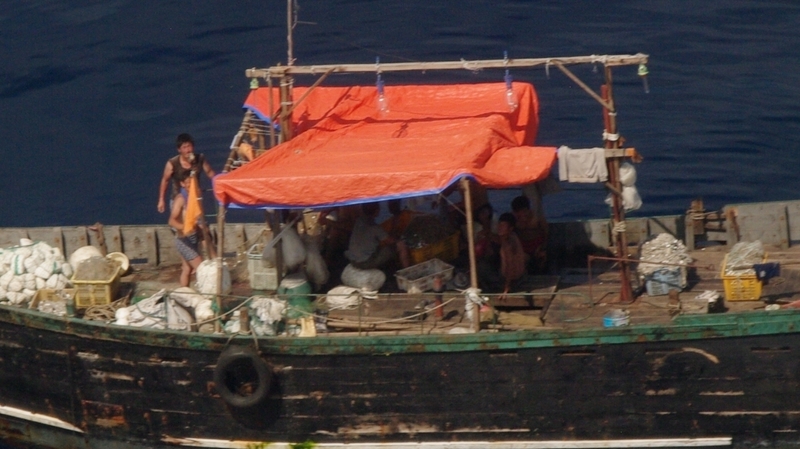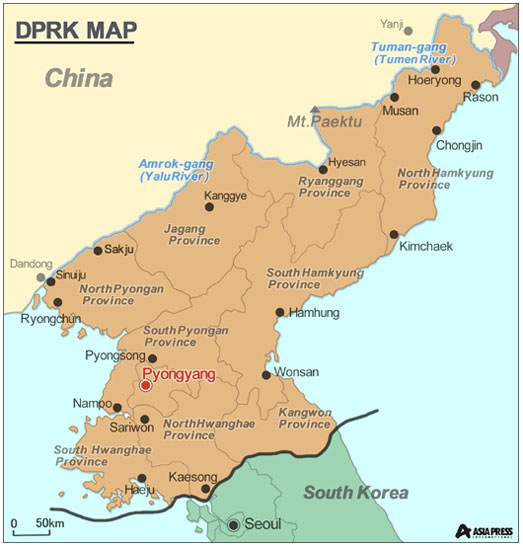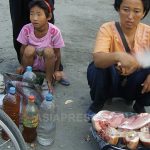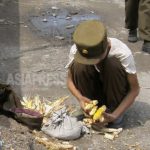
◆Can Drifting Garbage Spread Coronavirus?
Chongjin City in North Hamkyung Province is the largest fishing center on the east coast. The Kim Jong-un regime has banned residents from approaching the coastline since the beginning of last year under the guise of preventing the influx of coronavirus and has strongly restricted fishing boats from fishing in the area.
This is because of the risk of catching coronavirus from drifting garbage. It may sound absurd, but people have even been forbidden from touching trash that has drifted ashore or picking up wakame seaweed on the beach. The restrictions on fishing boats are believed to be due to the regime’s fear that fishers might come into contact with foreign vessels while at sea, where surveillance is difficult.
As a result, many who had been fishing with small wooden or iron boats were reduced to living like kochebi (vagrants) due to their reduced cash income and resulting poverty.
Fishing was allowed only for medium and large fishing boats of state-run fisheries offices and fisheries offices affiliated with the party and military. However, even these vessels had to abide by a strict passenger limit, fever check protocols, and disinfection procedures when leaving and returning to port. In addition, crew members were not allowed to enter cities wearing the clothes they were working in at sea.

In September, restrictions were gradually relaxed, and small boats were allowed to fish again. "This was to coincide with the sandfish fishing season," explained a reporting partner living in Chongjin city.
The sandfish fishing season reaches its peak around November. It used to be exported to Japan in the past. The sandfish gather near land in late autumn to spawn and can thus be caught in coastal waters.
"Although private boats are banned from fishing, smaller fisheries businesses have been allowed to fish for sandfish. As a result, the price dropped from about 9,000 North Korean won (1.94 USD) per kilogram in the market to 1,800 won (0.39 USD) in November. It was a blessing for the common people."
※1 USD is about 4650 won.
Yet, the authorities suddenly closed the Chongjin fishing port entirely on November 20.
◆ Fishing Prohibited due to Violation of Coronavirus Quarantine Regulations
Ports were apparently closed in response to some companies breaking quarantine regulations. As a result, the price of the sandfish has risen again, reaching 3,000 won (0.65 USD) at the beginning of December. Our reporting partner explained the situation as follows.
"The closure period is 40 days. Although there were strict instructions to quarantine the vessels when entering and exiting the port, fishing boats of fisheries establishments and some boats of administrators did not do this properly. They did not even check the temperature of the crew."
This probably means that fishing has been banned for the rest of the year. It is unclear whether this measure is limited to Chongjin city or whether it extends to other parts of the east and west coasts (Kang Ji-won / ISHIMARU Jiro).
※ ASIAPRESS contacts its reporting partners in North Korea through smuggled Chinese mobile phones.
- <Inside N. Korea> North Korea's border with China is under martial law (2021-12-05)
- <Inside N. Korea> For Some Reason, the Power Situation Suddenly Improves. So Why do Some Cities Get 10 Hours of Power a Day? (2021-12-01)
- <Inside N. Korea>Outbreak of “10-Day Flu” in North Korea: Authorities Restrict Attendance at Work Due to Lack of Medical Supplies (2021-11-30)
- <Inside N. Korea> The Great Annoyance of Kim Jong-un's Visit to Samjiyon: Residents Forbidden to Step Out for Several Days (2021-11-25)
- Top Secret Documents on North Korea's 'Tongpyo’: Regime Admits to Suspending the Issuance of Banknotes Due to Financial Woes (2021-11-13)



![<Inside N. Korea> The Deteriorating Plight of the People (1) Residents Impoverished by Excessive Coronavirus Quarantine Measures [ISHIMARU Jiro]](https://www.asiapress.org/rimjin-gang/wp-content/uploads/2021/07/202107-dandong-04_logo-150x150.jpeg)





















